The C4 with a 6-speed electronic gearbox system
|
 |
|
Premiered on the C4 and mated to the HDi 110 DPFS
engine, the 6-speed electronic gearbox system is of an
entirely new design.
This highly driveable engine boasts a range of
advantages. Electro-hydraulic gearbox control makes for
smooth, fast gear changing. At the same time,
automated gear and clutch management cuts fuel
consumption by between 3% and 5%, compared with a
conventional manual gearbox.
This new gearbox therefore provides a real alternative
to manual and automatic transmissions, not only in terms
of driveability and comfort, but also in terms of fuel
economy and a particularly attractive customer price. It
joins the long list of innovative equipment available on
the C4, for safety, convenience and on-board comfort.
A vehicle of innovative design and features that has
picked up an array of prizes (including "World Car
Design 2006" at the recent New York International
Motor Show), the C4 is enjoying considerable market
success. More than 350,000 vehicles have been sold to
date.
|
|
The C4 HDi 110 DPFS equipped with the new 6-speed
electronic gearbox system will be available from June
2006.
|
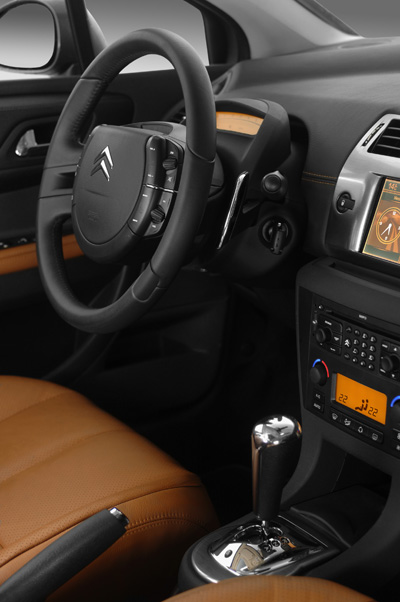 |
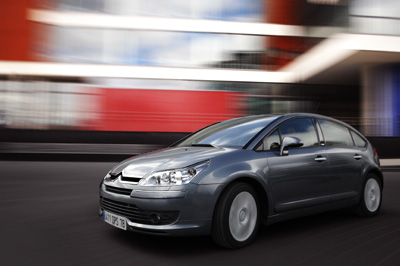 |
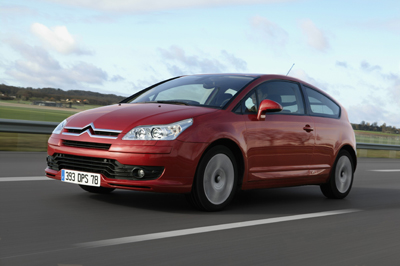 |
|
By means of automating gear changes and clutch control,
this new gearbox obtains a reduction of fuel
consumption on the order of 3 to 5% in comparison
to a conventional manual gearbox. Fuel savings are
boosted by the presence of a 6th gear.
Due to its particularly fuel-efficient engine, the C4
HDi 110 DPFS with the six-speed electronic gearbox
system thus brings fuel consumption down to 4.5 litres
per 100 kilometres in a combined cycle, with CO2
emissions of 120 grams per kilometre.
The six-speed electronic gearbox system offers
outstanding user comfort and responsiveness to the
driverís commands. Its electro-hydraulic control system
ensures smooth and lightning-fast gear changes in a
wide range of transmission ratios, which makes
driving with this gearbox particularly pleasant.
The new gearbox permanently adapts to the driverís
behaviour and reinforces his driving sensations in sports
mode, which makes gear changes even faster. It
also offers him peace of mind and driving comfort with
the hill-hold control and easy acceleration
dosage when manoeuvring, particularly in reverse.
The six-speed electronic gearbox system offers a real
alternative to conventional automatic or manual
transmissions Ė by the driving pleasure it procures as
much as by the fuel savings it generates and its attractive
price.
This new gearbox expands the offer of automated manual
gearboxes already available in the CitroŽn range. These
are proposed in combination with petrol and diesel
engines in the C1, C2,
C3 and C3
Pluriel models. Since its introduction in 2002,
130,000 of these subcompacts were sold with the automated
manual gearbox SensoDrive.
|
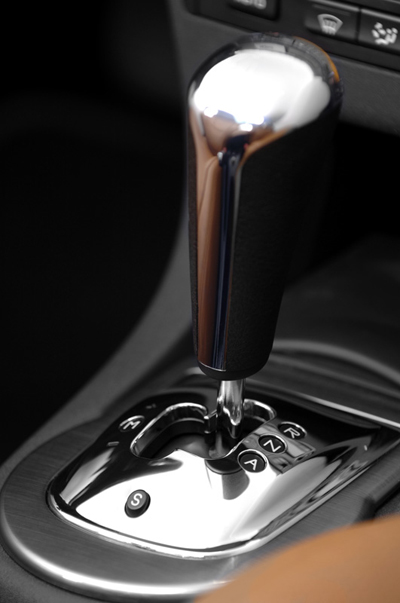 |
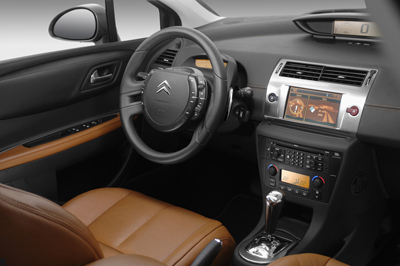 |
|
DRIVING PLEASURE IN MANUAL MODE AND IN AUTOMATED
MODE
The electronic gearbox system gives the driver a
choice between two driving modes:
-
a manual mode in which he retains full
control over gear changes by using the shift paddles
behind the steering wheel or the sequential shift
lever.
-
an automated mode in which the gear
selection is managed by the gearbox control unit.
At any time, the driver can switch from one mode to the
other, depending on his preferences and his environment:
main road, motorway, city, traffic jams.
Driving without constraints in manual mode
By activating manual mode, the driver decides at
which moment he or she wants to change gears, while at
the same time benefiting from the absence of the clutch
pedal.
The driver is permanently informed about the selected
gear by the information displayed on the instrument
panel.
He or she can change gears with the help of two types of
controls, which are perfectly substitutable:
-
Shift paddles behind the steering wheel
The right-hand paddle is used to change up, and
the left-hand paddle to change down. These paddles
give access to the six forward speeds. For maximum
comfort and safety, the paddles are fixed,
irrespective of the position of the steering wheel.
-
The sequential lever
On the shift gate, the manual mode is indicated
by the letter M, accompanied by the signs + for
changing up and Ė for changing down.
For safety reasons, only the shift lever can be used to
put the car into neutral (N) or reverse (R). The reverse
gear is available when the vehicle is moving at less
than 3.5 kph.
The shift lever has stable positions which indicate to
the driver the operating mode chosen Ė at the same time,
this mode is always displayed on the instrument panel.
But even when the driver selects the manual mode, the
automated manual gearbox ensures a high level of driving
comfort.
When the car slows down and stops (for example, when
approaching a stop sign or a traffic light), the gearbox
changes down automatically until it reaches 1st
gear.
Automatic downshifting is a function of several criteria
that are managed by the control unit (insufficient
engine speed, slope, sporty driving style, etc.).
The gearbox control unit also facilitates downshifting
by increasing engine speed to make gear changes smoother
and without jolts.
|
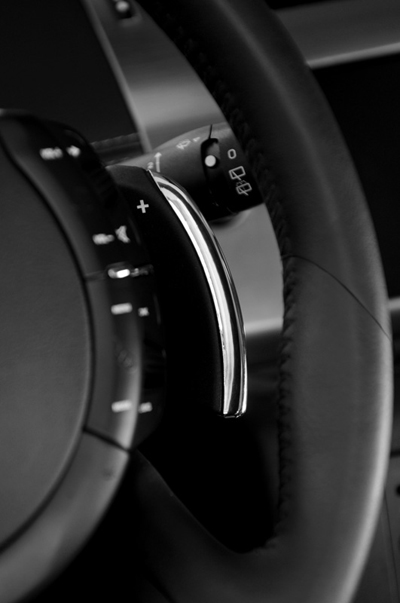 |
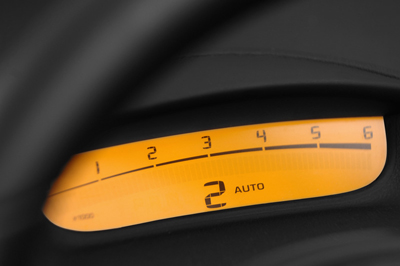 |
|
Stress-free driving in automated mode
In the automated mode, gear changes are managed
electronically in order to optimise driving comfort and
fuel consumption.
This mode is activated by placing the lever in position
A on the shift gate. If the driver opts for this driving
mode, the AUTO symbol is displayed on the instrument
panel, together with the gear engaged.
The gearbox control unit then selects the gear that is
best suited according to the auto-adapting shift
patterns that are determined as a function of the
driverís behaviour, the road type, engine rpm, vehicle
speed and grip conditions.
The system thus prevents situations in which engine
speed is too high or too low and proposes an economical
shift pattern aimed at lowering fuel consumption.
Optimised gear change management produces fuel savings
on the order of 3 to 5% in comparison to a manual
gearbox, depending on driving cycles.
However, certain specific situations are immediately
recognized and taken into account by the gearbox. These
include holding the engaged gear in phases of sustained
acceleration, downshifting when the car is
re-accelerating and holding the gear or downshifting to
assist the motor brake.
If the driver wants to take control of the gearbox while
driving in automated mode (for instance in an emergency
situation or while overtaking), he can do so
immediately. He merely needs to touch one of the
paddles, and his shift request is taken into account by
the gearbox. If no additional manual command is issued
by the driver during a short period thereafter (approx.
20 seconds), the gearbox switches back to automated
mode.
ENHANCED DRIVING COMFORT, FUEL SAVINGS AND PEACE OF
MIND
Six speeds for more drivability and lower fuel
consumption
The presence of six speeds in the electronic gearbox
system enables it to make optimal use of all the
qualities of the engine and guarantees, in both manual
and automated mode, perfect responsiveness and smooth
operation of the gearbox as well as reduced fuel
consumption and optimal acoustic comfort.
The design of the automated gearbox facilitates the use
of these six speeds by the driver:
- In manual mode it is sufficient to apply
pressure to the paddles (or to flick the shift lever)
to shift to the desired gear. Changing gears no longer
requires successive moves of the shift lever or
repeated clutch work.
- In automated mode, the gearbox makes optimal
use of the 6th gear to increase fuel
savings.
Electro-hydraulic controls for smooth and speedy
shifting
Due to the use of new electro-hydraulic actuators,
the six-speed electronic gearbox system makes shifting
gentle and smooth in both manual and automated mode.
Smooth shifting (with virtually no jolts) is not
obtained at the expense of shifting speed. The six-speed
electronic gearbox system reconciles both and
distinguishes itself by the speed with which it manages
gear changes.
The time for a gear change is:
- 0.8 seconds for changing a gear in manual mode,
- 1.2 seconds for changing a gear in automated mode.
In addition, the six-speed electronic gearbox system
offers precise and easy dosage of acceleration during
manoeuvres, particularly in reverse. The accelerator
responds quickly to all demands, smoothly and without
jolts.
A sport mode for even more responsiveness
The six-speed electronic gearbox system of the C4
also offers a sport mode. This mode, which is available
with both manual and automated operation, constantly
favours fast gear changes. The total time required for
shifting is thus brought down to 0.4 seconds in manual
mode and 0.5 seconds in automated mode.
In automated mode, the sport mode is obtained by
implementing specific shift pattern: upshifts and
downshifts are triggered at higher engine speeds than in
normal operation.
The sport mode is activated by the S button on the shift
gate. Once selected, an S is displayed on
the instrument panel.
Hill-hold control for more safety
For improved safety, the C4 with six-speed
electronic gearbox system is equipped with a hill-hold
control that facilitates starting off on a slope.
On a slope, the control holds the vehicle for two
seconds after the driver has taken his foot off the
brake. It thus makes it possible to safely accelerate
the car when starting off or manoeuvring on a slope, and
to re-start the car without any stress.
The ESP activates the hill-hold control and temporarily
keeps the brakes applied when the driver takes his or
her foot off the brake to accelerate.
This assistance is provided when starting on an uphill
or downhill slope, both in forward gear and in reverse,
and the hill-hold control is activated on slopes with a
gradient of 3% and higher.
|
 |
|
|
|